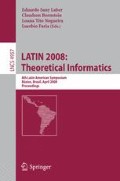Abstract
It is known that graphs on n vertices with minimum degree at least 3 have spanning trees with at least n/4 + 2 leaves and that this can be improved to (n + 4)/3 for cubic graphs without the diamond K 4 − e as a subgraph. We generalize the second result by proving that every graph with minimum degree at least 3, without diamonds and certain subgraphs called blossoms, has a spanning tree with at least (n + 4)/3 leaves. We show that it is necessary to exclude blossoms in order to obtain a bound of the form n/3 + c.
We use the new bound to obtain a simple FPT algorithm, which decides in O(m) + O *(6.75k) time whether a graph of size m has a spanning tree with at least k leaves. This improves the best known time complexity for Max-Leaves Spanning Tree.
Access this chapter
Tax calculation will be finalised at checkout
Purchases are for personal use only
Preview
Unable to display preview. Download preview PDF.
References
Bodlaender, H.L.: On linear time minor tests with depth-first search. J. Algorithms 14(1), 1–23 (1993)
Bonsma, P.S.: Sparse cuts, matching-cuts and leafy trees in graphs. PhD thesis, University of Twente, Enschede, the Netherlands (2006), http://purl.org/utwente/57117
Bonsma, P.S., Brueggemann, T., Woeginger, G.J.: A faster FPT algorithm for finding spanning trees with many leaves. In: Rovan, B., Vojtáš, P. (eds.) MFCS 2003. LNCS, vol. 2747, pp. 259–268. Springer, Heidelberg (2003)
Correa, J.R., Fernandes, C.G., Matamala, M., Wakabayashi, Y.: A 5/3-approximation for finding spanning trees with many leaves in cubic graphs. In: WAOA 2007 (to appear, 2007)
Estivill-Castro, V., Fellows, M.R., Langston, M.A., Rosamond, F.A.: FPT is P-time extremal structure I. In: ACiD 2005. Texts in algorithmics, vol. 4, pp. 1–41. King’s College Publications
Flum, J., Grohe, M.: Parameterized complexity theory. Springer, Berlin (2006)
Griggs, J.R., Kleitman, D.J., Shastri, A.: Spanning trees with many leaves in cubic graphs. J. Graph Theory 13(6), 669–695 (1989)
Kleitman, D.J., West, D.B.: Spanning trees with many leaves. SIAM J. Discrete Math. 4(1), 99–106 (1991)
Solis-Oba, R.: 2-approximation algorithm for finding a spanning tree with maximum number of leaves. In: Bilardi, G., Pietracaprina, A., Italiano, G.F., Pucci, G. (eds.) ESA 1998. LNCS, vol. 1461, pp. 441–452. Springer, Heidelberg (1998)
Author information
Authors and Affiliations
Editor information
Rights and permissions
Copyright information
© 2008 Springer-Verlag Berlin Heidelberg
About this paper
Cite this paper
Bonsma, P., Zickfeld, F. (2008). Spanning Trees with Many Leaves in Graphs without Diamonds and Blossoms. In: Laber, E.S., Bornstein, C., Nogueira, L.T., Faria, L. (eds) LATIN 2008: Theoretical Informatics. LATIN 2008. Lecture Notes in Computer Science, vol 4957. Springer, Berlin, Heidelberg. https://doi.org/10.1007/978-3-540-78773-0_46
Download citation
DOI: https://doi.org/10.1007/978-3-540-78773-0_46
Publisher Name: Springer, Berlin, Heidelberg
Print ISBN: 978-3-540-78772-3
Online ISBN: 978-3-540-78773-0
eBook Packages: Computer ScienceComputer Science (R0)

